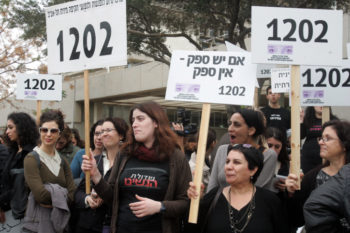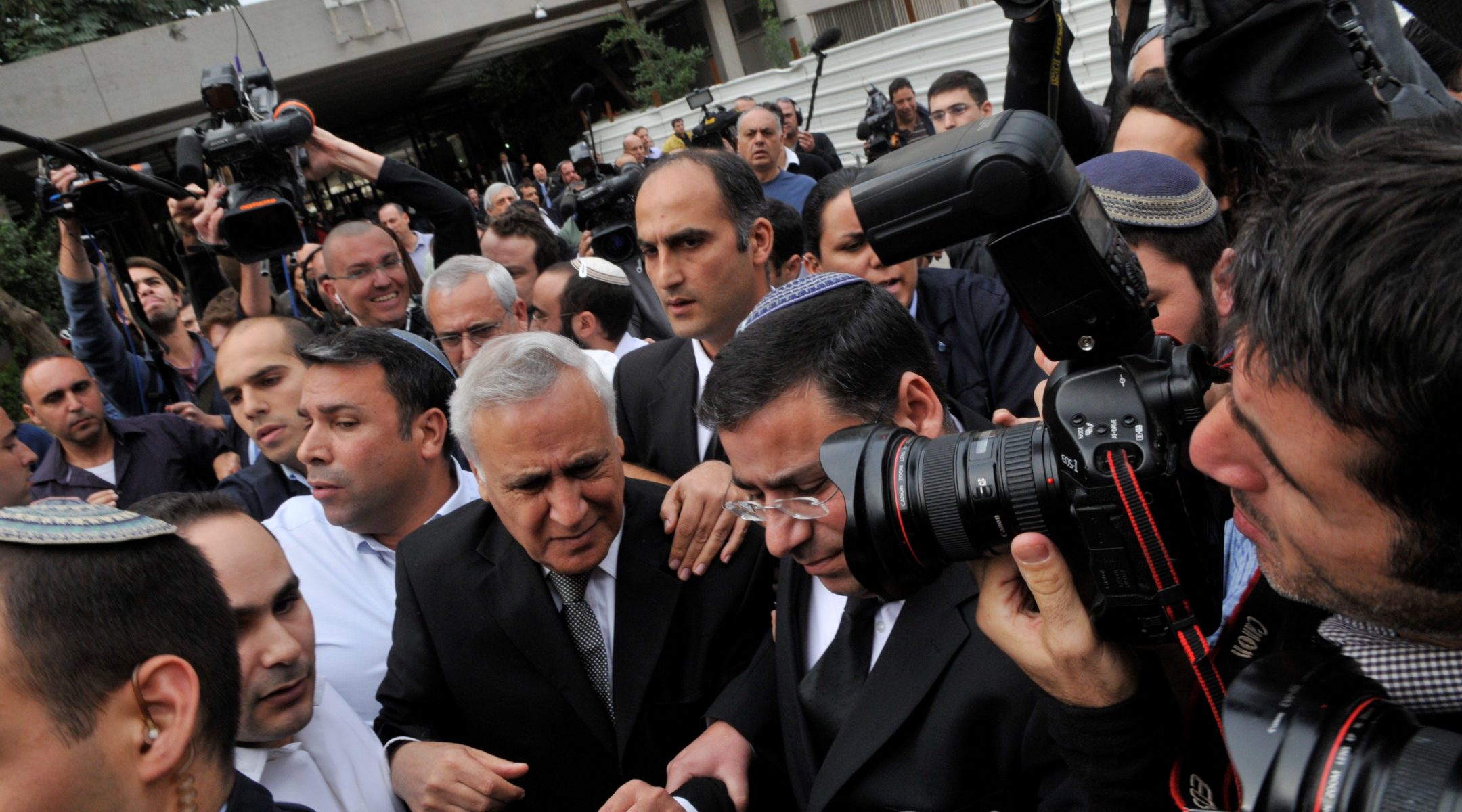
Women demonstrating outside the Tel Aviv courtroom where former Israeli President Moshe Katsav was convicted of rape and other sex crimes, Dec. 30, 2010. (Roni Schutzer/Flash90)
TEL AVIV (JTA) — For years it was considered an open secret in Israeli political and media circles that Moshe Katsav had a habit of sexually harassing women who worked for him.
In a nation at arms with a decidedly machismo bent, sexual encounters between powerful male politicians and military officers and their female staff often were seen as a perk of the job and such behavior quietly was accepted as part of the culture, if unhappily by many women.
But then came last week’s “earthquake,” as Israeli newspapers described it: Katsav, Israel’s president from 2000 to 2007, was convicted of rape, sexual assault and harassment.
Walking out of the crowded Tel Aviv courtroom where Katsav had just been convicted on Dec. 30, Merav Michaeli, a leading Israeli feminist and well-known television personality, hailed what she said she hoped signaled a cultural shift.
“I wish I could tell you this will change the face of Israeli society, but even if it does not it is another step, a sign of change,” she said. “The judges believed the women and understood and recognized the impossible position women are often placed in when working for such powerful men.”
Katsav’s conviction, handed down in a scathing ruling by a panel of three judges who called the former president a liar and expressly stated that when a woman says “no” she means it, was hailed as a historic day for women’s rights and even for Israeli democracy.
Many Israelis say the conviction represents a watershed moment in Israel’s transition to a new set of societal rules about what is considered acceptable — and legal — behavior when it comes to relations between men and women, particularly in the workplace.
Moshe Negbi, a legal analyst for Israel Radio, said the verdict may come to symbolize “a mortal blow to the macho culture that turns women into an object of despicable sexual exploitation.”
The transition took hold years ago. In 1998, the Knesset passed a groundbreaking sexual harassment law. An important test case soon followed when Yitzhak Mordechai, a former general and defense minister who ran for prime minister, was forced to resign from government in 2001 after being convicted of sexual assault and harassment against several women who had worked for him.
Then came the case of Haim Ramon, at the time the justice minister, who was indicted in 2006 for indecent conduct and in 2007 was found guilty of kissing a female soldier against her will. Most recently Uri Bar-Lev, a major general in the police force and a top contender for the job of Israel’s next national police commissioner, dropped out of the running for the post last fall after being accused of sexual assault.
“In the past there was this conception that we should not damage the respect given to officers or any man in a powerful position, and if [sexual harassment] happened to a woman it was probably her fault — it was a great way to hush everything up,” said Efrat Nachmany Bar, a colonel in the Israeli army reserves who until her retirement four years ago served as the army’s representative to the Knesset on issues of sexual harassment.
In her current position as deputy director of the Israeli Institute for Dignity, she lectures on the topic throughout the country.
About Katsav, Nachmany Bar said, “Everyone knew and everyone was quiet. But now it has become not just his personal business but a societal issue.
“The Israeli public is now saying, ‘Let’s not be quiet anymore, but let’s talk. And let’s also talk about why we did not talk before,’ ” she said.
Nachmany Bar credits the army for being ahead of the curve of Israeli civil society when it comes to confronting sexual harassment. She held workshops and lectures, and ran help lines for soldiers and officers for 16 years. She also sat on the committee that disciplined sexual harassment cases.
That era coincided with women increasingly taking on combat support roles in the army.
Israel’s existence as a military society often gets the blame for forging a male-dominated culture, Nachmany Bar said, but “the issue goes beyond the army. I think a militaristic culture is not one borne from security risks alone, although that strengthens it, but of patriarchy itself.”
As part of the context for understanding the Israeli culture, she and other experts cited Israel’s history as a country forged on the image of the new Jew — the strong, muscular contrast to notions of the Diaspora Jew as pale, stooped and decidedly unmanly.
“Part of the Zionist project was to prove that Israeli men are the real Jewish men,” Nachmany Bar said. “The image of the Israeli man as soldier is part of this.”
Using the Hebrew term “gever gever,” slang for a “real man,” she said, “Part of being this real man is to be in control all the time — the idea being that if we are to be a real man in regards to a woman, the man needs to lead and the woman needs to follow.”
A national survey done this year by the Ministry of Trade and Industry found that 40 percent of women reported experiencing some form of sexual harassment on the job.
Avigail Moor, who heads the women’s studies department at Tel Chai College, said her research found that the figure for actual harassment, reported or not, appears to be higher: some 60 percent of the Israeli female workforce. The figure is similar to other Western countries, she said.
Sexual assault and rape hotlines have been overloaded in the aftermath of the Katsav conviction with calls coming in from across the country.
Moor, a psychologist, said the question now is how much Israeli men will internalize the message handed down by the court.
“If this is the beginning of a new era, it could have a spectacular effect,” Moor said. “If women come forward in large numbers it could also trigger a backlash. Any social revolution, and this is what it is, has its ups and downs.”
JTA has documented Jewish history in real-time for over a century. Keep our journalism strong by joining us in supporting independent, award-winning reporting.






